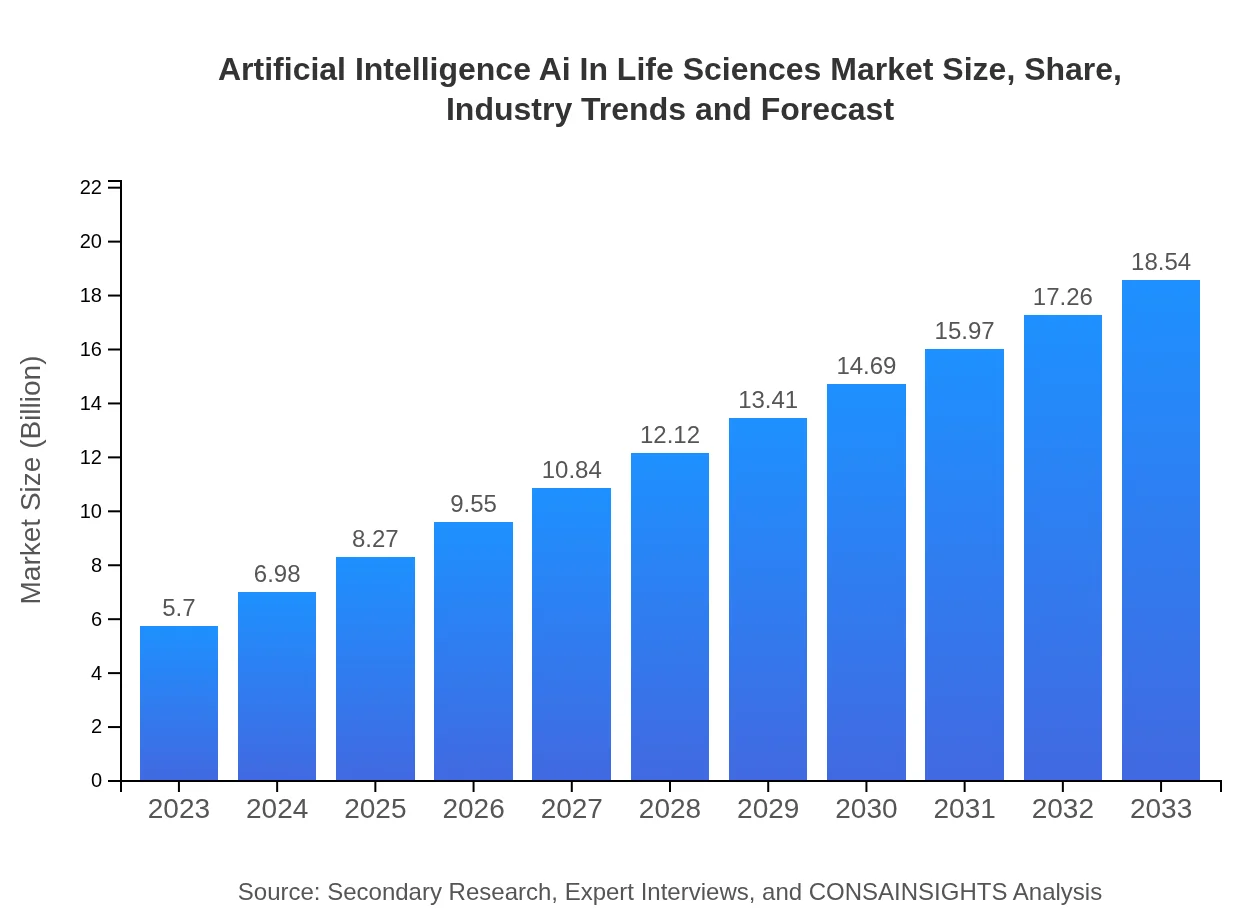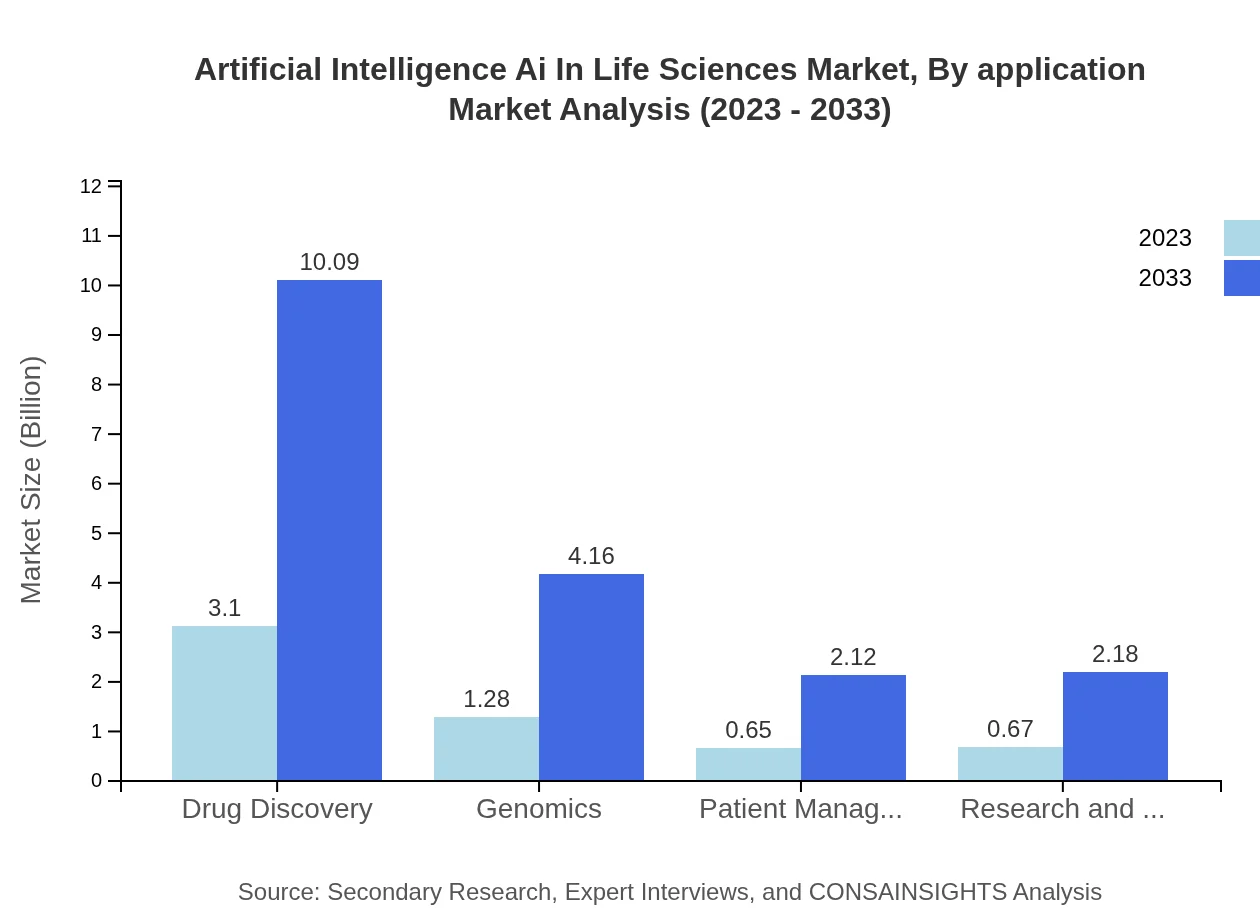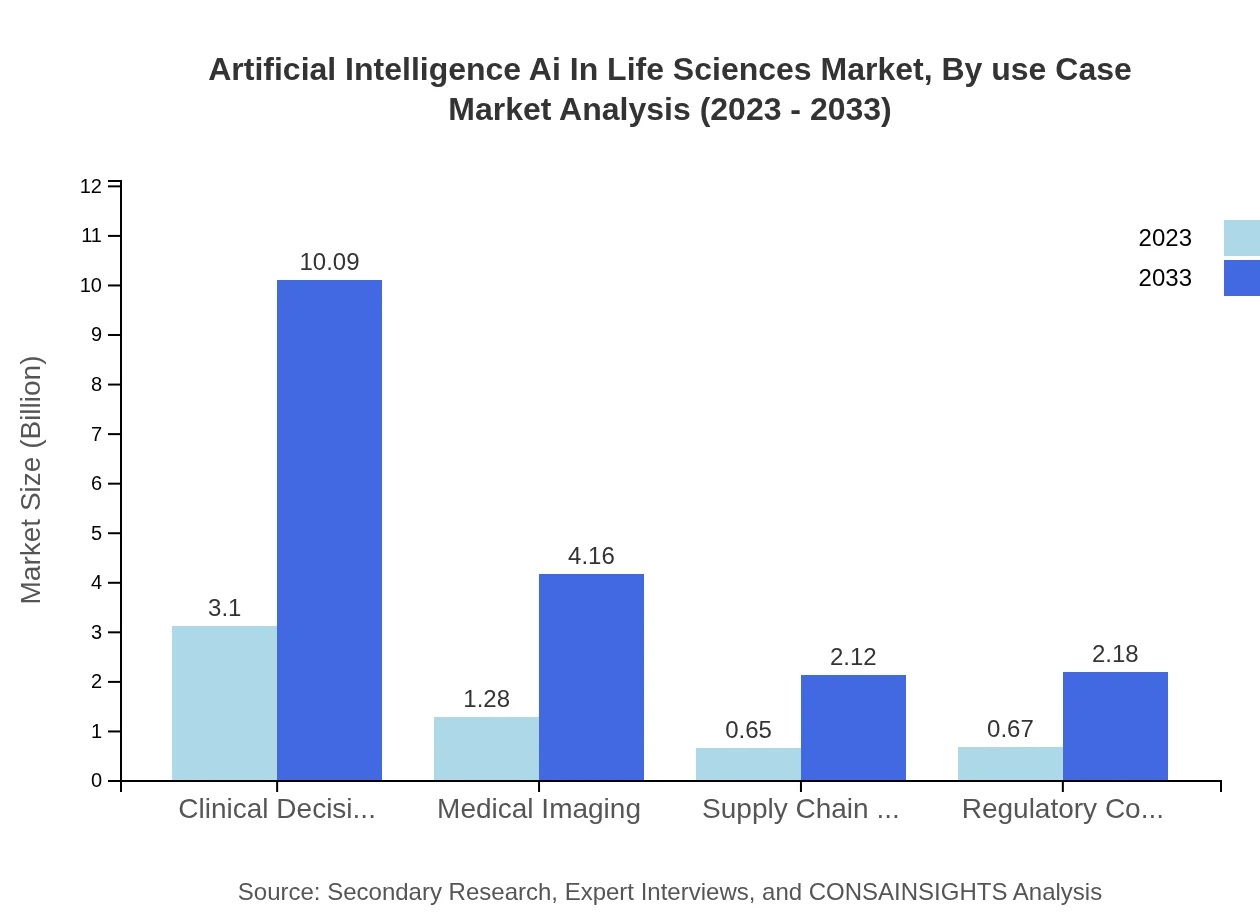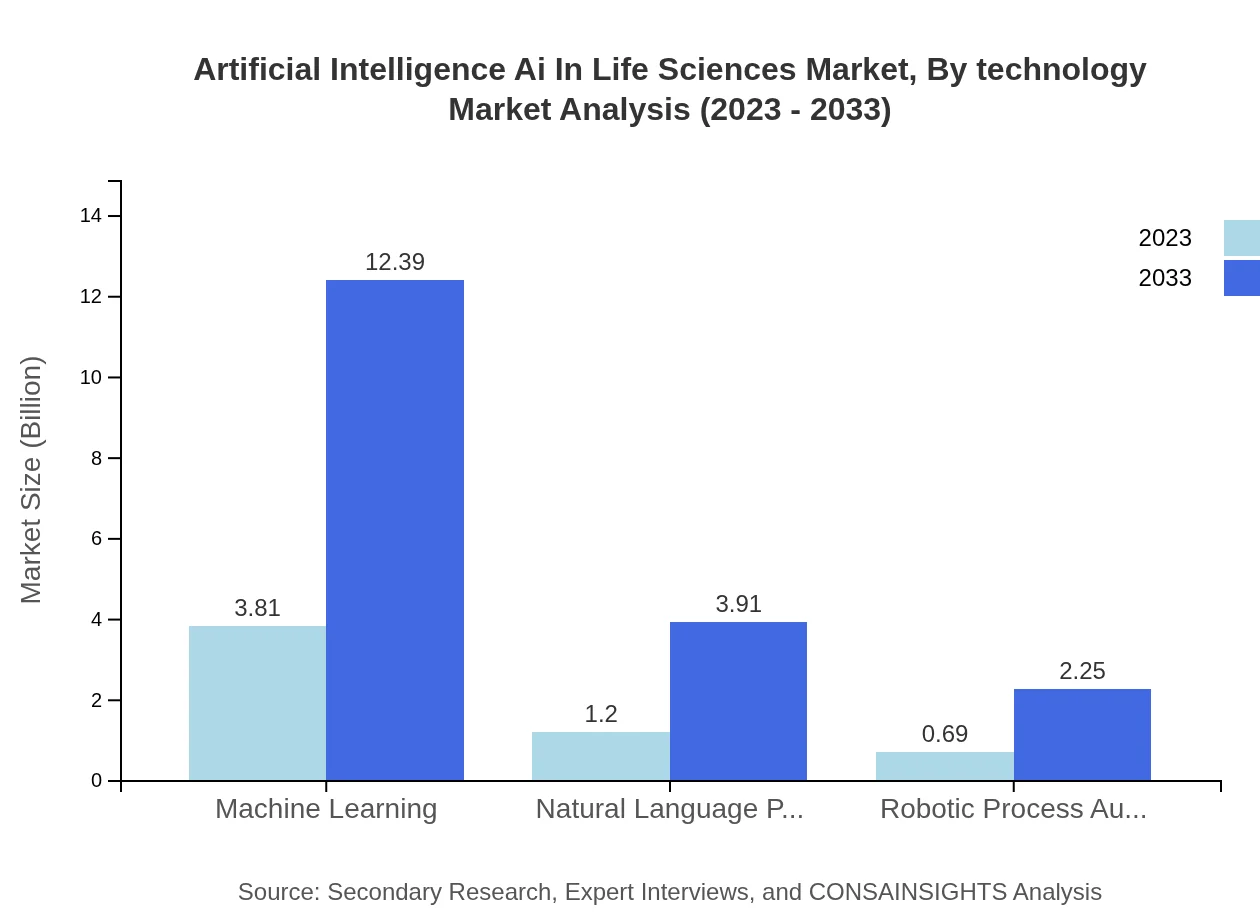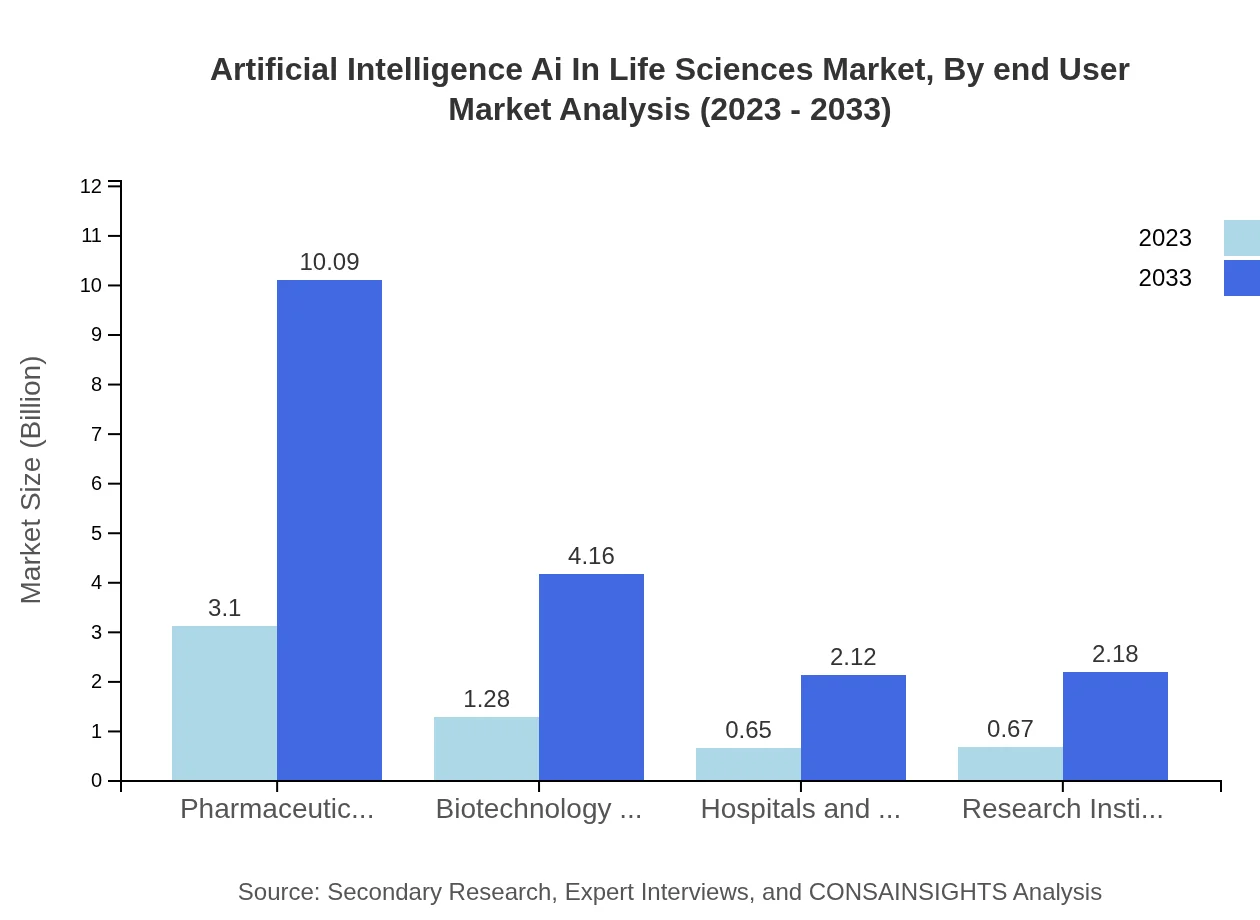Artificial Intelligence Ai In Life Sciences Market Report
Published Date: 31 January 2026 | Report Code: artificial-intelligence-ai-in-life-sciences
Artificial Intelligence Ai In Life Sciences Market Size, Share, Industry Trends and Forecast to 2033
This report analyzes the growing impact of artificial intelligence in the life sciences sector, delivering comprehensive insights into market trends, growth forecasts, and strategic implications for the period 2023-2033.
| Metric | Value |
|---|---|
| Study Period | 2023 - 2033 |
| 2023 Market Size | $5.70 Billion |
| CAGR (2023-2033) | 12% |
| 2033 Market Size | $18.54 Billion |
| Top Companies | IBM Watson, Google Health, Microsoft Azure Health Bot, NVIDIA |
| Last Modified Date | 31 January 2026 |
Artificial Intelligence Ai In Life Sciences Market Overview
Customize Artificial Intelligence Ai In Life Sciences Market Report market research report
- ✔ Get in-depth analysis of Artificial Intelligence Ai In Life Sciences market size, growth, and forecasts.
- ✔ Understand Artificial Intelligence Ai In Life Sciences's regional dynamics and industry-specific trends.
- ✔ Identify potential applications, end-user demand, and growth segments in Artificial Intelligence Ai In Life Sciences
What is the Market Size & CAGR of Artificial Intelligence Ai In Life Sciences market in 2023?
Artificial Intelligence Ai In Life Sciences Industry Analysis
Artificial Intelligence Ai In Life Sciences Market Segmentation and Scope
Tell us your focus area and get a customized research report.
Artificial Intelligence Ai In Life Sciences Market Analysis Report by Region
Europe Artificial Intelligence Ai In Life Sciences Market Report:
Europe’s market is expected to expand from $1.96 billion in 2023 to $6.38 billion by 2033. The region emphasizes regulatory compliance and unique healthcare systems, supporting the adoption of AI in life sciences.Asia Pacific Artificial Intelligence Ai In Life Sciences Market Report:
The Asia Pacific region is poised for substantial growth, projected to reach approximately $3.46 billion by 2033, driven by advancements in healthcare infrastructure and increasing adoption of AI solutions among healthcare providers and research institutions.North America Artificial Intelligence Ai In Life Sciences Market Report:
North America leads the AI in Life Sciences market, with a size of approximately $1.94 billion in 2023, forecasted to reach $6.31 billion by 2033. This growth is fueled by extensive R&D initiatives, high investment levels, and a focus on precision medicine.South America Artificial Intelligence Ai In Life Sciences Market Report:
In South America, the market is expected to grow from $0.26 billion in 2023 to $0.86 billion by 2033. The development of AI technologies is still in nascent stages but presents significant opportunities, primarily through enhanced drug research and diagnostics.Middle East & Africa Artificial Intelligence Ai In Life Sciences Market Report:
The Middle East and Africa market is forecasted to grow from $0.47 billion to $1.54 billion during the same period, driven by increasing collaborations among healthcare stakeholders to improve patient outcomes and operational efficiencies.Tell us your focus area and get a customized research report.
Artificial Intelligence Ai In Life Sciences Market Analysis By Application
In the AI in Life Sciences market, pharmaceutical companies dominate with revenues of $3.10 billion in 2023 and projected growth to $10.09 billion by 2033. This segment's significance is attributed to the reliance on AI for drug development, outcomes prediction, and operational optimization.
Artificial Intelligence Ai In Life Sciences Market Analysis By Use Case
Machine learning applications lead the market with a size of $3.81 billion in 2023, expected to grow to $12.39 billion by 2033. It holds a 66.79% market share, demonstrating its essential role in data analysis and predictive modeling.
Artificial Intelligence Ai In Life Sciences Market Analysis By Technology
Natural language processing (NLP) technology is gaining traction, projected to increase from $1.20 billion to $3.91 billion during the forecast period. This technology enables effective data extraction, analysis of unstructured data, and enhanced patient communication.
Artificial Intelligence Ai In Life Sciences Market Analysis By End User
Hospitals and clinics are important end-users, expected to grow from $0.65 billion in 2023 to $2.12 billion by 2033. Their adoption focuses on improving patient care through predictive analytics and tailored health management solutions.
Artificial Intelligence Ai In Life Sciences Market Trends and Future Forecast
Tell us your focus area and get a customized research report.
Global Market Leaders and Top Companies in Artificial Intelligence Ai In Life Sciences Industry
IBM Watson:
IBM Watson provides AI-powered solutions for healthcare and life sciences, focusing on medical data processing and personalized treatment plans.Google Health:
Google Health is leveraging AI to advance healthcare analytics, imaging, and population health management, aiming to improve patient outcomes through data insights.Microsoft Azure Health Bot:
Microsoft's Azure Health Bot is designed for developing AI applications in life sciences, incorporating machine learning and comprehensive data analytics.NVIDIA:
NVIDIA focuses on AI-driven computing for personalized medicine, drug discovery, and genomic analysis through high-performance computing technologies.We're grateful to work with incredible clients.









FAQs
What is the market size of Artificial Intelligence in Life Sciences?
The market size for Artificial Intelligence in Life Sciences is projected to reach $5.7 billion by 2033, with a compound annual growth rate (CAGR) of 12% from 2023 to 2033. This growth indicates a robust expansion in AI applications within the sector.
What are the key market players or companies in the Artificial Intelligence in Life Sciences industry?
Key market players include large technology firms and specialized biotech companies developing AI solutions for drug discovery, patient management, and medical imaging. These companies are vital for driving innovation and adoption of AI technologies across life sciences.
What are the primary factors driving the growth in the Artificial Intelligence in Life Sciences industry?
Growth is driven by advancements in machine learning, increasing digital data in healthcare, demand for personalized medicine, and the need for cost optimization in drug development and clinical processes. These elements foster greater AI integration in life sciences.
Which region is the fastest Growing in the Artificial Intelligence in Life Sciences?
The North American region is the fastest-growing, projected to increase from $1.94 billion in 2023 to $6.31 billion by 2033. Other notable regions include Europe and Asia Pacific, reflecting significant growth opportunities in AI adaptations.
Does ConsaInsights provide customized market report data for the Artificial Intelligence in Life Sciences industry?
Yes, ConsaInsights offers customized market report data tailored to specific needs within the Artificial Intelligence in Life Sciences industry. This includes segment analysis and forecasts, helping organizations make informed decisions.
What deliverables can I expect from this Artificial Intelligence in Life Sciences market research project?
Deliverables include comprehensive market analysis reports, segmented data on regional and global trends, competitive landscape insights, and actionable strategies based on forecast methodologies covering various segments within AI and life sciences.
What are the market trends of Artificial Intelligence in Life Sciences?
Current trends include increasing use of machine learning for drug discovery, expanding applications in genomics and disease diagnosis, and the integration of AI in clinical decision support systems. Such trends highlight AI's transformative role in the sector.

